The best thing Japan can do to support the US pivot—not what you think
Posted By Hayley Channer on May 19, 2014 @ 12:30
The most important and often overlooked thing Japan can do to support the US pivot and the long-term strength of the US-Japan alliance is to fix its economy and, in turn, further deepen and broaden US-Japan economic ties. So says Dr Satu Limaye, Director of the East West Center in Washington DC. Success in that area, combined with further defence collaboration with the US and improved Japanese relations with its neighbours, will be what Limaye calls the ‘triple crown’ of the continued centrality of the US-Japan relationship to the US rebalance to Asia.
According to Limaye, Japan needs to become again an engine for economic growth in the region. Without successfully addressing its economic problems, ‘Japan won’t be able to afford to fund its defence programs or respond to its major demographic challenges’, which include an ageing and declining population [2].
While the state of Japan’s economy might not be as bad as some say [3], Japan does have serious economic problems. Entrenched deflation resulting in weakened demand, slow growth [4], government debt more than twice GDP [5] and structural problems are all issues the Abe administration is seeking to address. Limaye hopes that Japan will find the solution to its economic troubles through Prime Minister Shinzo Abe’s ‘Abenomics’.
Abenomics [6], which includes a loose monetary stance, fiscal stimulus and structural reforms, was launched following Abe’s election at the end of 2012. After almost a year and a half, is Abenomics really working? The short answer is yes [7]: immediate GDP growth (from 0.9 to 1.7 %), an increase in the stock market and yen depreciation leading to a hike in wages and potentially higher spending are all seen as signs that Abenomics is making progress. But the hesitation to deem Abenomics a success at this early stage is captured by Justin Wolfers of the Brookings Institute. Referring to the recent improvements in the Japanese economy, Wolfers asks [8] whether this is evidence of a ‘slow adjustment to a policy that will have large long-run effects or a small initial effect because there is only going to be a small long-run effect’. Whether Abenomics will bring long-term benefits for Japan and allow it to respond to its demographic challenges and commit more to defence and foreign policy initiatives is yet to be seen. Improvements to the Japanese economy won’t happen quickly.
Part of the structural reform necessary to improve Japan’s economy includes reaching agreement with the US on the Trans-Pacific Partnership (TPP), a potential economic pact among 12 nations. The TPP, which has become the economic component of the US rebalance to Asia, has faced delays and the chance to clinch the deal with Japan was missed [9] during Obama’s recent trip to Tokyo.
Speaking at an event in Washington earlier this month, former White House adviser on Asia Dr Victor Cha asserted that, should the TPP come off, ‘it will be by far the most important aspect of the pivot’. Like Limaye, Cha views Japan’s economic decisions as the major area in which Japan could support the US pivot: ‘The best thing Japan could do is to come to an agreement on the TPP. The US has no other real demands of Japan other than that’. But as Abe campaigned on the promise to protect Japan’s agricultural sector and farming lobbies continue to exert pressure, Abe will have to renege on his promise or further petition the US to exempt key Japanese goods—and Obama has his own challenges coming from Congress. With no future TPP negotiations scheduled and an elapsed 2014 deadline, the TPP looks far away.
In Washington, experts hold slightly different views on how the success or failure of the TPP would impact the overall pivot. According to Limaye, if the TPP doesn’t come to fruition it wouldn’t signal the death knell of rebalance, but it would leave a gaping hole for China to fill with its regional economic initiative, the Regional Comprehensive Economic Partnership (RCEP). [10] A failed TPP, Limaye contends, would ‘be a missed opportunity to take full advantage of Asia’s rising middle class’. Cha believes similarly that if the TPP fails, ‘it doesn’t mean the pivot has failed: the military aspect of the pivot has reaffirmed US staying power in the region’. And, if the TPP succeeds, ‘the strategic balance in the region would tilt in favour of the United States’.
Other Washington-based experts are more pessimistic. One analyst said that, should the TPP fail, it would be extremely bad for the rebalance and for America. There‘d be a loss of confidence in America regionally, and domestically the US would lack the capacity to reform the structure of the economy.
If Japan wants to support the pivot and revitalise its economy Abe will need to convince the US to allow Japan concessions in the TPP or he’ll need to make some difficult —and unpopular—domestic choices. On Abenomics, close attention should and will continue to be paid to its progress. But the Abe administration must be willing to withstand public discontent if the reforms cause discomfort over the longer term. In short, Japanese support for the rebalance will take both careful maneuvering and courage from the Abe administration.
Hayley Channer is an analyst at ASPI. She is currently a visiting scholar at the East-West Center, Washington DC. Image courtesy of the White House [11].
Article printed from The Strategist: https://aspistrategist.ru
URL to article: /the-best-thing-japan-can-do-to-support-the-us-pivot-not-what-you-think/
URLs in this post:
[1] Image: https://aspistrategist.ru/wp-content/uploads/2014/05/Obama-Abe.jpg
[2] ageing and declining population: http://thediplomat.com/2014/03/japans-demographic-crisis-any-way-out/
[3] might not be as bad as some say: http://carnegieendowment.org/2014/04/25/truth-about-japan-s-economic-decline/h93f
[4] slow growth: http://online.wsj.com/news/articles/SB10001424052702304704504579429773036857740
[5] government debt more than twice GDP: http://www.cnbc.com/id/101529249
[6] Abenomics: http://www.cfr.org/japan/abenomics-japanese-economy/p30383
[7] answer is yes: http://online.wsj.com/news/articles/SB10001424052702303663604579502822670689240
[8] Wolfers asks: http://www.brookings.edu/about/projects/bpea/papers/2014/abenomics-preliminary-analysis-and-outlook
[9] the chance to clinch the deal with Japan was missed: http://www.reuters.com/article/2014/04/25/us-japan-usa-idUSBREA3O03W20140425
[10] Regional Comprehensive Economic Partnership (RCEP).: http://www.eastasiaforum.org/2013/05/15/why-the-rcep-matters-for-asia-and-the-world/
[11] White House: http://www.whitehouse.gov/sites/default/files/imagecache/gallery_img_full/image/image_file/008_e1a7323.jpg
Click here to print.
